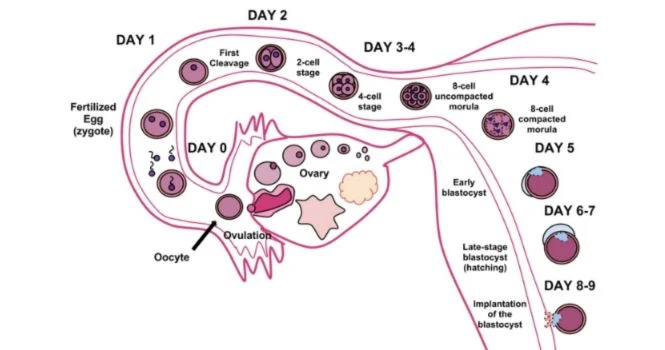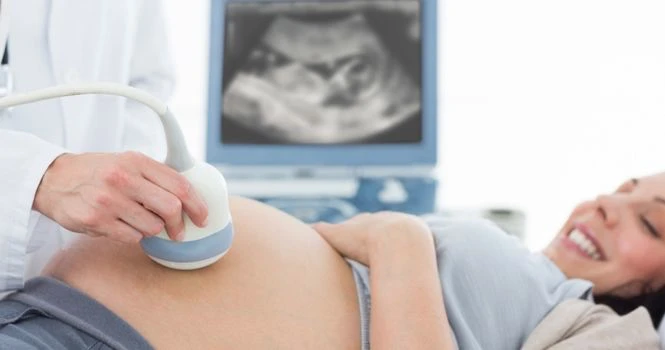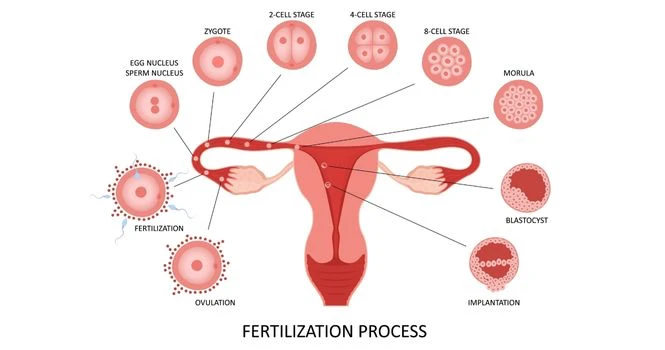After the couple has sex, the sperms are deposited in the Vagina, and the sperms make way from the vagina to the cervix and into the Uterus. In the Uterus, they travel to the fallopian tube to meet the egg, released by the ovaries.
Once fertilized, also the Zygote, which is formed after the union of Sperm and Egg(Ovum), travels to the uterus and attaches to the Uterine Wall. This Process is called Implantation.
When Does Implantation Typically Occur?
Implantation, a critical phase in early pregnancy, typically occurs about 6 to 12 days after conception. This process, where the fertilized egg attaches itself to the uterine wall, marks the beginning of a pregnancy.
Understanding the timing of implantation is crucial for women tracking their menstrual cycle and fertility period. It’s often accompanied by signs like implantation bleeding or cramping, which can be mistaken for an early period.
Recognizing the symptoms and timing of implantation can assist in early pregnancy detection and prenatal care. This period is also significant for those utilizing assisted reproductive technologies (ART), such as IVF, as it influences the success rates of these procedures.
By identifying the window when implantation typically occurs, women and healthcare providers can better monitor and manage the early stages of pregnancy.
What is hCG?
Human Chorionic Gonadotropin, commonly known as hCG, is a hormone that plays a crucial role in early pregnancy. It is produced by the developing placenta after the fertilized egg has implanted itself into the uterine lining.
We would be testing whether hCG is present in urine or not, with Urine Pregnancy Testing Kits.
Initial hCG production:
Once implantation occurs, the developing placenta starts producing hCG. In the early stages, hCG levels are relatively low but will begin to double every 48 to 72 hours.
How Long After Implantation Do hCG Levels Start to Rise?
It usually takes a few days after implantation for hCG levels to become high enough to be detected by a home pregnancy test. For most women, this occurs around the time of their expected period, or about 13-16 days after ovulation. However, hCG levels can vary widely, and some women may have detectable levels earlier or later than others.
Why Are hCG Levels Important To Track During Early Pregnancy?
Human Chorionic Gonadotropin (hCG) levels are crucial in monitoring early pregnancy health and development. hCG, a hormone produced after implantation, is vital for maintaining the pregnancy.
Tracking hCG levels helps in confirming pregnancy, determining the approximate age of the fetus, and identifying potential issues like ectopic pregnancy or miscarriage. Elevated or lower-than-expected hCG levels can indicate multiple pregnancies, like twins or triplets, or pregnancy complications.
Regular hCG monitoring, typically through blood tests, is essential for ensuring the well-being of both the mother and the developing fetus during the critical stages of early pregnancy.
Symptoms of Rising hCG Levels
Rising levels of human chorionic gonadotropin (hCG), a hormone crucial in early pregnancy, are associated with several notable symptoms. As hCG levels increase, typically following a successful conception and implantation, you may observe:
1. Missed Period: One of the earliest signs of pregnancy is a missed menstrual cycle, indicating rising hCG levels.
2. Morning Sickness: Nausea and vomiting, often referred to as morning sickness, can be attributed to increased hCG levels and usually begin around the 6th week of pregnancy.
3. Breast Changes: Enhanced sensitivity, soreness, and swelling of the breasts are common as hCG levels rise, causing hormonal changes.
4. Frequent Urination: Higher hCG levels can lead to increased blood flow to the pelvic area, resulting in more frequent urination.
5. Fatigue: Elevated hCG levels, along with other hormonal changes, can contribute to a significant feeling of tiredness or exhaustion.
6. Enhanced Sense of Smell: Many pregnant women report a heightened sense of smell, which can be linked to increased hCG and hormonal changes.
7. Mood Swings: The fluctuating hormone levels, including hCG, can lead to emotional variability or mood swings.
It’s important to remember that these symptoms can vary widely among individuals and do not necessarily confirm pregnancy on their own.
Factors That May Delay hCG Levels After Implantation
There are several factors that may delay the rise in human chorionic gonadotropin (hCG) levels after implantation, affecting the detection of pregnancy:
1. Late Implantation: Implantation typically occurs 6 to 12 days post-conception. If implantation happens towards the later end of this range, hCG levels may take longer to reach detectable levels.
2. Individual Hormonal Differences: Every woman’s body is different. Some may naturally produce hCG at a slower rate, delaying the hormone’s detectability in pregnancy tests.
3. Variation in Cycle Length: Women with longer menstrual cycles may experience later ovulation and subsequently delayed implantation and hCG production.
4. Miscalculated Conception Date: Incorrectly estimating the date of conception can lead to assumptions that hCG levels are rising more slowly than expected.
5. Type of Pregnancy Test Used: Not all pregnancy tests have the same sensitivity. Tests with higher hCG detection thresholds may not pick up on the hormone as early as more sensitive tests.
6. Ectopic Pregnancy: In some cases, an ectopic pregnancy, where the embryo implants outside the uterus, can lead to unusual hCG levels.
7. Miscarriage or Fetal Viability Issues: Unfortunately, issues with the viability of the pregnancy, including miscarriage, can affect hCG levels.
It’s important to consult your doctor if there are concerns about hCG levels or the progression of a pregnancy. They can provide more accurate assessments through blood tests and ultrasounds.
How Soon After Implantation Can You Take a Pregnancy Test?
You can take a pregnancy test as soon as 7 to 10 days after ovulation, which is typically when implantation occurs. Implantation usually happens about 6 to 12 days after conception. Once implantation occurs, the body begins producing the hormone human chorionic gonadotropin (hCG), which is what pregnancy tests detect.
However, for the most accurate results, it’s generally recommended to wait until you have missed your period before taking a pregnancy test. This is because the hCG levels in your body may not be high enough to be detected immediately after implantation. Waiting until after your missed period usually gives your body enough time to produce a detectable level of hCG.
Each person’s body is different, and some may produce detectable levels of hCG slightly earlier than others. Therefore, if you take a test early and get a negative result but still suspect you might be pregnant, it may be worthwhile to retest a few days later.
Also, using a more sensitive pregnancy test can also increase the likelihood of an earlier detection. If there’s any uncertainty or if you have specific health concerns, it’s always a good idea to consult with a doctor.
When to take the Home Urine Pregnancy Test?
The best time to take a home urine pregnancy test is usually at the time of your missed period or a few days after. This allows enough time for the hormone human chorionic gonadotropin (hCG) to rise in your urine and be detected by the test. hCG levels typically begin to rise after implantation, which occurs about 6-12 days after ovulation.
Here are a few guidelines to consider when taking a home urine pregnancy test:
- Wait until your missed period: While some tests claim to detect pregnancy a few days before your missed period, it is generally more accurate to wait until the day your period is due or a few days after. Testing too early may result in a false negative if hCG levels have not yet reached a detectable threshold.
- Test with the first morning urine: The first urine of the day usually contains the highest concentration of hCG, increasing the likelihood of a positive result if you are pregnant. If you can’t test with your first morning urine, try to hold your urine for a few hours before testing to allow hCG levels to build up.
- Follow the instructions carefully: Each home pregnancy test may have slightly different instructions. To ensure accurate results, it’s crucial to follow the test’s instructions, including the recommended wait time before reading the results.
- Repeat the test if needed: If you receive a negative result but still suspect pregnancy, consider waiting a few days and testing again. hCG levels double approximately every 48 to 72 hours in early pregnancy, so testing after a few days may yield a positive result if you are pregnant.
By waiting until your missed period or a few days after, testing with your first morning urine, and following the instructions carefully, you can improve the accuracy of your home urine pregnancy test and obtain more reliable results.
Can You Take a Pregnancy Test After Implantation Bleeding?
Yes, you can take a pregnancy test after implantation bleeding. Implantation bleeding generally occurs about 6 to 12 days after conception, and once implantation happens, your body starts producing the pregnancy hormone hCG.
This is what a pregnancy test detects. For more accurate results, it’s often recommended to wait a few days after the bleeding stops to allow hCG levels to increase to a detectable level.













